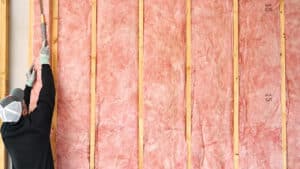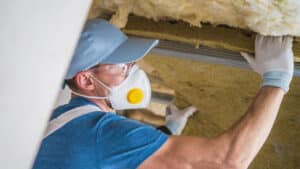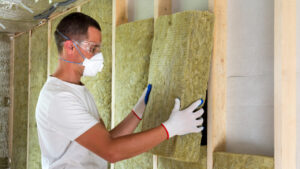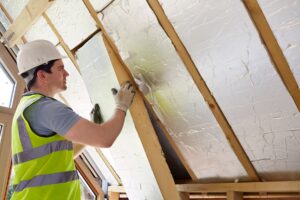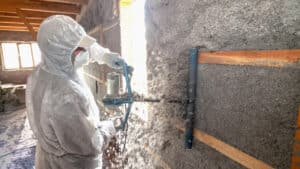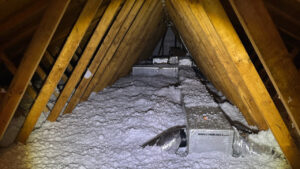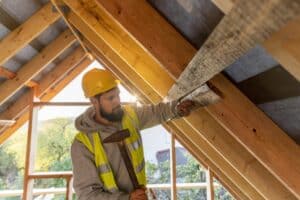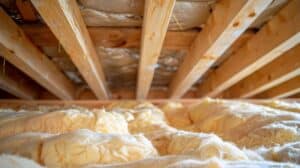Most of us see a dark, cold, unsightly room, with a peaked ceiling when we picture an attic. While this is the case for many homes across the United States it is not the only option. Attic insulation offers many benefits including an array of options available to transform the space. The following top five reasons to get attic insulation may lead you to consider this space more often.
Reduces Energy Costs
Insulating your home offers the monetary benefit of reducing energy costs. The attic is one of the easiest places to add insulation to your home. It is also one of the most efficient places to add insulation. The attic typically covers the entire length of your home. Nearly every room is affected by the insulation in your attic.
Attic insulation will reduce the energy costs incurred due to controlling your home’s temperature by reducing the airflow both in and out of your home through the attic. Because the attic spreads across the top of the entire home, attic insulation stabilizes the temperature throughout your family’s home.
Stabilizes Temperature
Attic insulation reduces energy costs because the addition of insulation stabilizes the temperature throughout the home. Air leaks through cracks, crevices, openings, and soft materials throughout your home. Air leakage is commonly found near windows, doors, crawlspaces, and attics.
Insulating your attic prevents a large amount of this leakage from occurring. Often homeowners notice that certain areas in their home are warmer or cooler than others. Often, we hear loved ones complain that their basement is cold and their upstairs is hot.
Hot air rises. Naturally, higher rooms will maintain a warmer temperature due to airflow. When a home is efficiently insulated the air can not escape the home, thus pushing the air throughout the home. This regulates and stabilizes the temperature throughout your entire house.
Increases Home Value
When homeowners list their homes for sale, they often include an R-value in the listing. An R-Value is a number that represents a material’s ability to reduce heat flow. Homeowners utilize their home’s R-value to inform sellers of their home’s ability to regulate temperature. The R-value rises as the home’s ability to regulate temperature increases.
In addition to improving a home’s R-value, attic insulation could qualify your home as energy-efficient. Energy-efficient homes are highly sought after due to the expectation that utility bills will cost less and preserve the Earth’s natural resources. Utilizing less energy means reducing your carbon footprint. In addition to preserving Earth’s natural resources and limiting pollution, attic insulation is often created from recycled materials.
The benefits and efficiency of attic insulation increase the value of your home. Attic insulation qualifies as an upgrade that adds to the value of your home. The benefits of lower energy bills, stable home temperature, and energy efficiency increase the value of your home as well as the home’s ability to sell quickly.
A home that sells quickly is often purchased at the asking price or higher. The longer your home is on the market, the more likely your real estate agent will push for a price cut.
Prevents Damage
Insulating your attic will reduce drafts and energy costs, but it can also be installed for preventative measures. Regardless of whether you notice temperature fluctuations, attic insulation is necessary to prevent damage to your home.
Attic insulation can prevent condensation and structural damage. Condensation often seems like a minor issue, but over time it can result in structural damage. The moisture from condensation is often absorbed by the materials used to construct your home. The roof, walls, and ceiling of your home are created from wood. Wood absorbs liquids.
As you heat your home, moisture is carried through the air. Hot air tends to rise to the attic, depositing moisture on the ceiling, walls, and floor as it moves through the space and escapes your home. Over time, this moisture causes wood to rot, mold, or mildew. In extreme cases, moisture can even erode cement.
Attic insulation can also prevent pests from entering and making their own homes in yours. While some pests are simply an annoying inconvenience, others cause damage to your home. Eliminating these pests’ ability to enter prevents avoidable damage to your attic and the rest of your space
Creates Additional Space
Typically, attic insulation is only considered after a problem has been detected. This is because many families only enter their attics on occasion. In contrast to our kitchen, bathroom, and bedroom, attics are generally only considered when searching for an item that is rarely used.
Installing insulation in your attic could change that. Instead of serving as a storage space, your attic could become an additional space in your home. Once insulated, your attic could be remodeled to create an additional bedroom, game room, or living space.
Creating this additional space offers you, as the homeowner, options. However, it also increases the living area of your home and provides you with a greater amount of square feet. Whether the space can be added to the listed square feet of your home, or not, it can be listed as a ‘bonus space’ when you sell your home.
Conclusion
Insulating an attic costs between one and seven dollars per square foot. These costs are similar to the costs of replacing your home’s flooring. Attic insulation is a cost-effective home improvement. The addition of attic insulation could save your money in the long run and increase the value of your home. For homeowners with no intention of selling, attic insulation increases your comfort due to its ability to stabilize the temperatures throughout your home. Consider insulating your attic for your next home improvement project.

